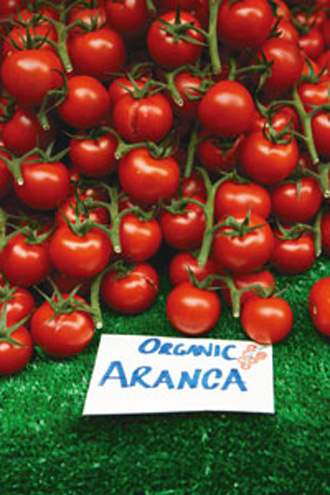 Can organic tomatoes taste like cardboard?
Can organic tomatoes taste like cardboard?
Q: Question for sociology professor Howard Sacks: "Organic" foods are becoming more and more common, in supermarkets and specialty stores alike. What does "organic" really mean? Are organic foods fresher? Are they produced and marketed in a more "socially responsible" way?
A: Generally speaking, "organic" foods have been produced without synthetic inputs. Organic vegetables are grown free of chemical fertilizers, herbicides, and pesticides. Organic meat comes from animals raised in chemical-free pastures, without growth hormones or antibiotics in their feed. Also, organic growers maintain that their farming methods build soil fertility, produce higher quality food, and protect the environment.
But it's more complicated than that. "Organic" certification by the United States Department of Agriculture, designed to standardize criteria, does not ensure the absence of chemical residues. Some smaller growers who use organic methods don't bother with the bureaucracy and expense of obtaining certification. Their products may be more "purely" organic without actually bearing the government label.
And as organic foods become more prominent in high-volume supermarkets, they are just as likely as non-organic products to travel hundreds or thousands of miles. The growing distance between the farm and the supermarket shelf means that crops must be harvested before they're ripe and farmers are more likely to select varieties not for taste but for bruise resistance during shipping.
Personally, I place greater emphasis on local food, although much of what I eat is organic as well. My mantra is "know your food." The lamb in our freezer comes from our own farm, and the eggs and chicken we eat are raised on an organic operation just a mile away. The vegetables I don't grow in my own garden come from Mount Vernon's farmers' market.
When I buy locally produced food, I'm keeping my food dollars in the community, to recirculate through area businesses. By supporting area farmers, I help protect the agricultural landscape and maintain a rural way of life.
The decision to eat locally involves more than a change in what you buy. It also means changing the way you think about eating. For example, to maximize the use of local foods, I try to eat seasonally. In the winter, I might try a squash or root crop that I can find locally, rather than reaching for the more familiar green beans or asparagus that I can find at the supermarket but that comes from distant places.
It's easy to romanticize the organic and local food movements. I harbor no illusions about these movements suddenly transforming the global food system. The changes in agriculture since World War II reflect a general shift toward greater centralization and integration throughout our economy. But I do know that, in Ohio and elsewhere, increasing numbers of mainstream local farmers are searching for a more dependable alternative to the global market. I believe there's great value in a diverse food system that supports local farmers producing soybeans for Japan as well as those growing organic greens for Kenyon's dining hall.
Howard Sacks is a professor of sociology, senior advisor to the president at Kenyon, and director of the Rural Life Center. Sacks helped create Food for Thought, which includes the College's farm-to-dining-hall program as well as academic and outreach efforts aimed at building a local food network in Knox County.
Do you have feedback on this page?
